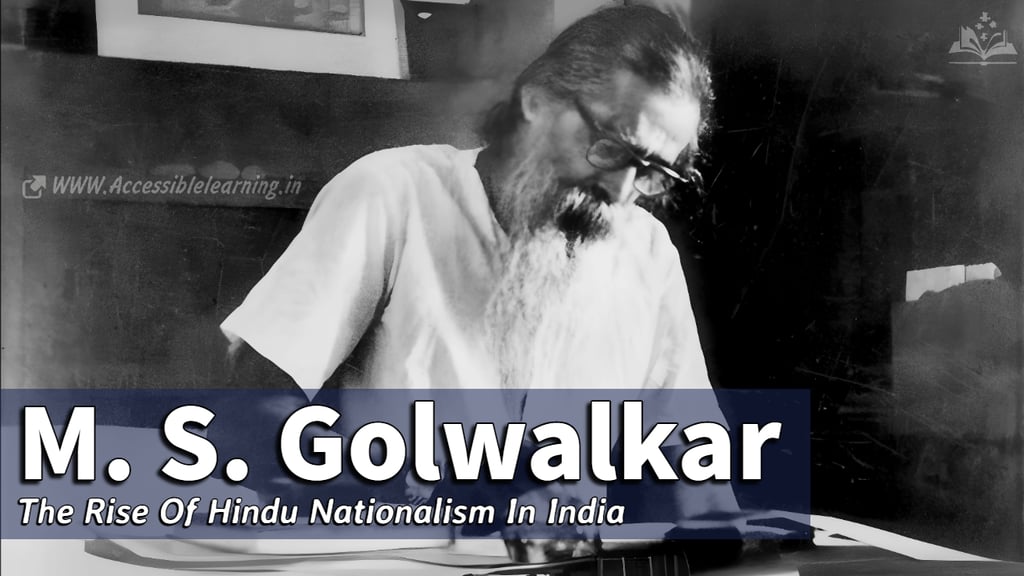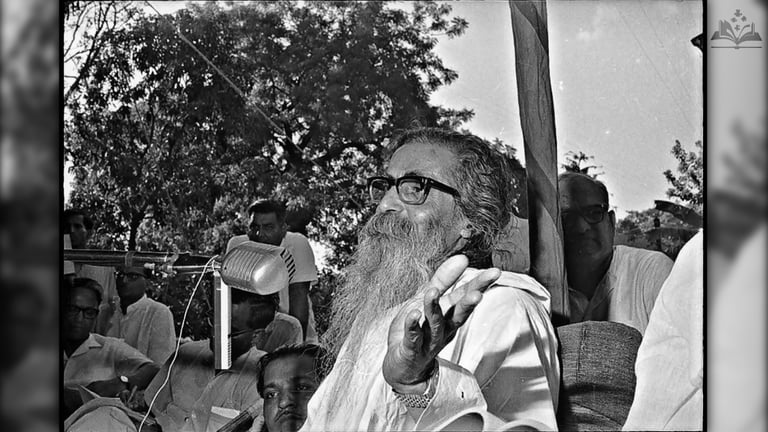
M. S. Golwalkar: Architect of Hindutva and RSS Ideology
Madhav Sadashiv Golwalkar, the second Sarsanghchalak of RSS, played a crucial role in shaping the ideology of Hindutva and nationalism in India. His leadership expanded RSS into a formidable socio-political force, influencing generations of leaders and organizations. Explore his life, contributions, controversies, and enduring legacy in this in-depth article.
INDIAN HISTORYTHE GREAT LEADERRSSEDUCATION/KNOWLEDGEBIOGRAPHY/HISTORY
Keshav Jha
2/9/20254 min read


Madhav Sadashiv Golwalkar/माधव सदाशिव गोलवलकर, popularly known as Guruji, was one of the most influential leaders of the Rashtriya Swayamsevak Sangh (RSS). Serving as the second Sarsanghchalak (chief) of RSS from 1940 to 1973, Golwalkar played a pivotal role in shaping the ideological framework of the organization. His vision of Hindutva, nationalism, and cultural identity remains a subject of study and debate in Indian politics and social discourse.
Early Life and Education
Born on February 19, 1906, in Nagpur, Maharashtra, Golwalkar was a bright student with a keen interest in philosophy and spirituality. He pursued a Master’s degree in Zoology from Banaras Hindu University (BHU) and later showed an inclination toward Vedanta philosophy. His spiritual quest led him to Ramakrishna Mission, where he briefly stayed as a disciple. However, he ultimately chose a path of national service rather than monastic life.
Entry into RSS
Golwalkar joined RSS in the early 1930s when Dr. Keshav Baliram Hedgewar, the founder of RSS, was building the organization. Hedgewar saw potential in young Golwalkar and mentored him. In 1940, just before his passing, Hedgewar appointed Golwalkar as his successor, making him the second Sarsanghchalak of RSS.
Contributions to RSS and Nationalism
Under Golwalkar’s leadership, RSS expanded significantly, both in terms of reach and influence. His tenure saw the transformation of RSS from a regional volunteer group into a nationwide sociopolitical force.
Strengthening the Ideological Base
Golwalkar emphasized the concept of Hindu Rashtra (Hindu Nation) and cultural nationalism. His book, Bunch of Thoughts, became a foundational text, outlining his vision of nationalism, Hindutva, and national unity.
Expansion of RSS Network
He strengthened the organizational structure, established shakhas (local branches), and expanded RSS activities into various sectors, including education, rural development, and disaster relief. Under his leadership, RSS-affiliated organizations like Vishwa Hindu Parishad (VHP), Akhil Bharatiya Vidyarthi Parishad (ABVP), and Bharatiya Mazdoor Sangh (BMS) were established.
Influence on Indian Politics
Golwalkar maintained a distance from direct electoral politics but had a significant influence on leaders who later shaped Jana Sangh (precursor to the Bharatiya Janata Party, BJP). His emphasis on self-reliance and Swadeshi ideals found resonance among nationalist movements. Many leaders, including Atal Bihari Vajpayee and L. K. Advani, acknowledged his ideological guidance.
Relations with the Government
Golwalkar had a complex relationship with the Indian government. The RSS was banned in 1948 following the assassination of Mahatma Gandhi, a decision that Golwalkar fiercely contested. He played a crucial role in ensuring the organization's revival by engaging in discussions with government officials and clarifying that RSS had no involvement in Gandhi’s assassination. Similarly, during the Emergency (1975-77) imposed by Indira Gandhi, the RSS faced a crackdown, and Golwalkar’s teachings continued to inspire the resistance against authoritarian rule.
Views and Controversies
Golwalkar's ideas on nationalism and cultural identity were widely debated. His belief in a homogeneous national identity, with Hindutva as the unifying force, led to criticism from secular and leftist groups. Some of his views on minorities, especially Muslims and Christians, sparked controversy, but his followers argue that he advocated cultural assimilation rather than exclusion. Critics often cite excerpts from his early writings, which they claim were exclusionary, while his supporters argue that his later years reflected a more nuanced perspective on nation-building and inclusion.
Legacy and Influence
Golwalkar passed away on June 5, 1973, but his legacy continues to shape Indian politics and cultural narratives. His contributions to RSS ensured that it became a formidable organization, influencing contemporary right-wing discourse in India. The rise of the BJP and other Sangh-affiliated organizations reflects the impact of his vision. His teachings continue to be referenced by modern-day leaders advocating for Hindutva and cultural nationalism.
Beyond politics, Golwalkar's emphasis on character building, discipline, and selfless service continues to guide RSS workers and volunteers. His vision of a self-reliant India remains a strong pillar in nationalist discourse, inspiring new generations of leaders in social and political spheres.
FAQs
Who was M. S. Golwalkar?
M. S. Golwalkar was a prominent Hindu nationalist leader and the second chief of RSS, known for shaping the ideology of Hindutva.
What is Golwalkar’s contribution to RSS?
He expanded the RSS network, established its ideological base, and played a crucial role in creating affiliated organizations like VHP and ABVP.
What is Bunch of Thoughts?
It is a book written by Golwalkar that outlines his views on nationalism, Hindutva, and Indian society.
Was Golwalkar involved in politics?
No, he did not engage in electoral politics, but he influenced nationalist leaders who later formed the Jana Sangh (precursor to BJP).
Why was RSS banned in 1948, and what was Golwalkar’s role?
After Mahatma Gandhi’s assassination, RSS was banned, but Golwalkar negotiated with the government to lift the ban by clarifying RSS’s stance.
What was Golwalkar’s view on minorities?
His views remain controversial; he advocated cultural assimilation but was criticized for his hardline stance on national identity.
When did M. S. Golwalkar pass away?
He passed away on June 5, 1973.


M. S. Golwalkar remains a towering figure in Indian socio-political history. While he is revered by many as the architect of Hindu nationalism, he is also viewed as a polarizing figure due to his strong ideological positions. Regardless of perspectives, his contributions to shaping India’s nationalist movement and the growth of RSS are undeniable. His teachings continue to inspire millions, making him one of the most significant ideological leaders of modern India.
Subscribe to our newsletter
All © Copyright reserved by Accessible-Learning
| Terms & Conditions
Knowledge is power. Learn with Us. 📚


